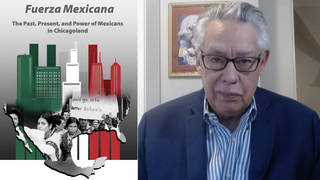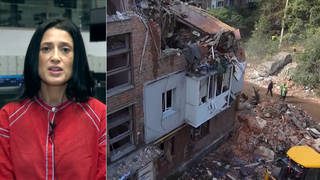
Related
Chicago-based Democracy Now! co-host Juan González gives an update on the Chicago mayoral race after incumbent Mayor Lori Lightfoot failed to advance to a runoff election. The two top candidates are now Paul Vallas, the former head of Chicago Public Schools, who has been endorsed by the local police union, and Brandon Johnson, an organizer with the Chicago Teachers Union. González says the race pits progressives in the city against centrist and conservative forces and could be a bellwether of where the Democratic Party goes.
Transcript
AMY GOODMAN: You’re there in Chicago, where this race took place yesterday for the mayor of Chicago, a lot of firsts. You know, you had Lori Lightfoot, who was the first African American woman mayor of Chicago, the first openly LGBTQ mayor of Chicago, and now she becomes the first incumbent mayor to go down in, what, something like 40 years. Can you talk about the Vallas versus Johnson runoff and the significance of what took place?
JUAN GONZÁLEZ: Yes, Amy. Well, Lori Lightfoot was deeply unpopular, as you mentioned. Her first term was less than stellar, I think most voters felt.
But this is shaping up now — the runoff on April 4th is shaping up to be a sort of classic battle between progressives, on the one hand, and centrist and conservative forces in Chicago, on the other.
Paul Vallas is a former CEO, not only of the Chicago Public Schools; he was also — he had a stint as superintendent of the Philadelphia public schools, as well as in New Orleans after Hurricane Katrina. He’s a big backer of charter schools, and, obviously, that is a major issue that the Chicago Teachers Union, from which Brandon Johnson emerges, is deeply opposed to. And he’s also had significant backing from real estate and business leaders. And his main issue, really — or, some people say his main three issues were crime, crime and crime. He promised — he’s promising more police officers on the streets. He touted last night in his election night speech that not only is his wife a police officer, one of his sons is a police officer, another is a firefighter. And he clearly is seeking the more conservative votes, not only among centrist Democrats but also among those who consider themselves Republicans in Chicago.
And Brandon Johnson, on the other hand, was strongly backed by several key labor unions, not only his own local, the Chicago Teachers Union and the Working Families Party, but the American Federation of Teachers, the parent union of CTU, poured in lots of money, as well, as did the Service Employees International Union, the healthcare division. So, this is — basically, key labor unions were backing Brandon Johnson, as well as progressives. And he was emphasizing that you fight crime, as well, by investing in communities and in alternatives for young people.
So it’s really shaping up to be a classic progressive versus conservative battle. The problem is that Vallas did get 34% of the vote, and so Brandon Johnson is going to have to really be able to get backing from a lot of the others who lost, including Congressman Chuy García, who came in fourth with 14%. What Lightfoot is going to do and her supporters are going to do is going to be critical. So, it’s going to be a tough race between now and April 4th to see which vision of urban governance wins out.
AMY GOODMAN: And do you see this as a message to the country and to Democrats, because this is actually a battle within the Democratic Party, the police union versus the teachers’ union in Chicago?
JUAN GONZÁLEZ: Yes, well, I mean, it is, because Chicago is such an important city in the nation, but we’ve been seeing this now play out in a lot of urban races, where a wing of the Democratic Party finds itself to some degree more in sync with some views of some independents and conservatives around once again putting the emphasis on fighting crime rather than trying to deal with the conditions that give rise to crime and with the social safety nets of urban cities. So, we’re going to be seeing this play out over and over again. And Chicago could be a bellwether as to how this will develop in the future.
AMY GOODMAN: Well, we’ll continue, of course, to follow this. The runoff election is April 4th.













Media Options